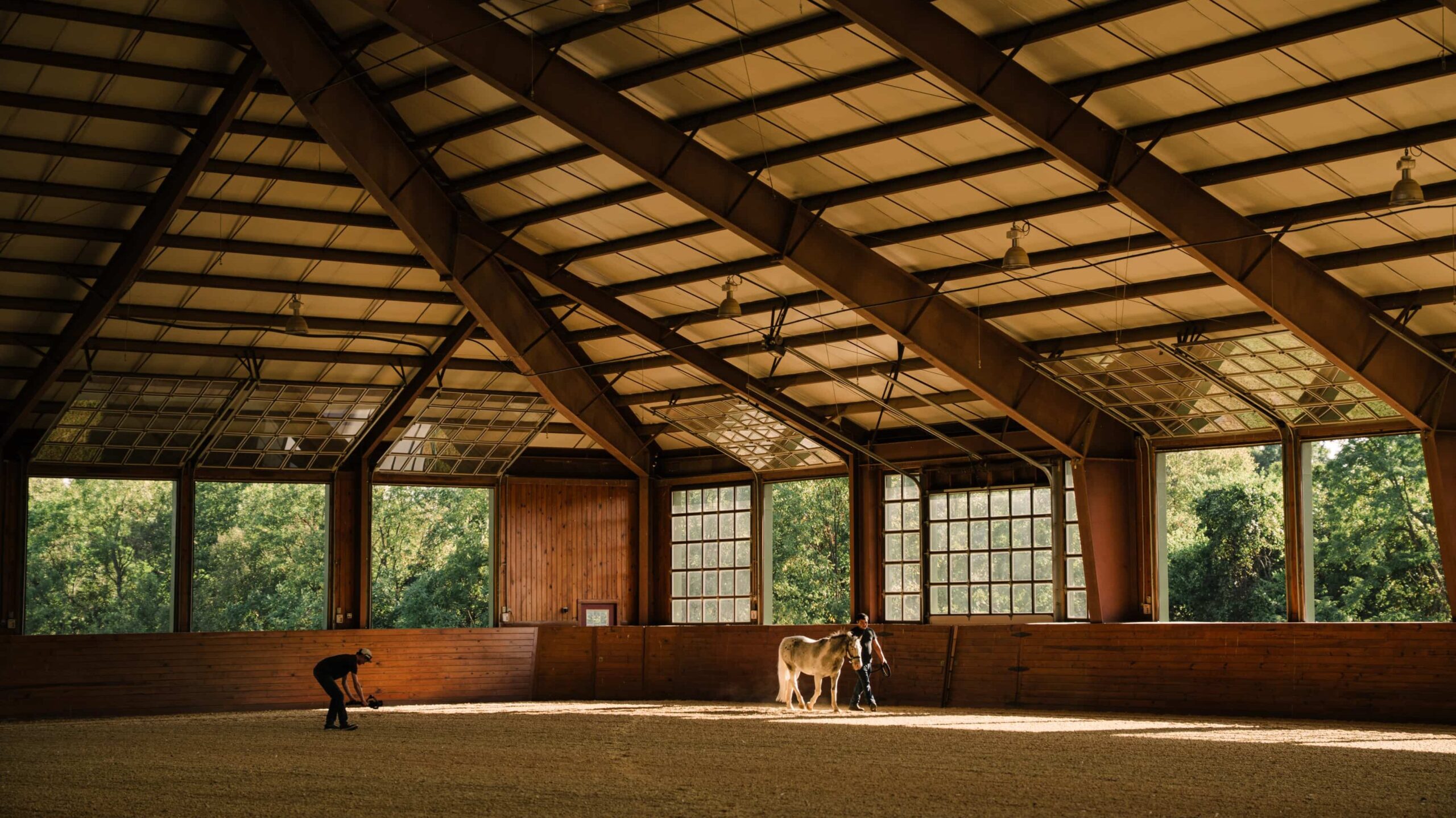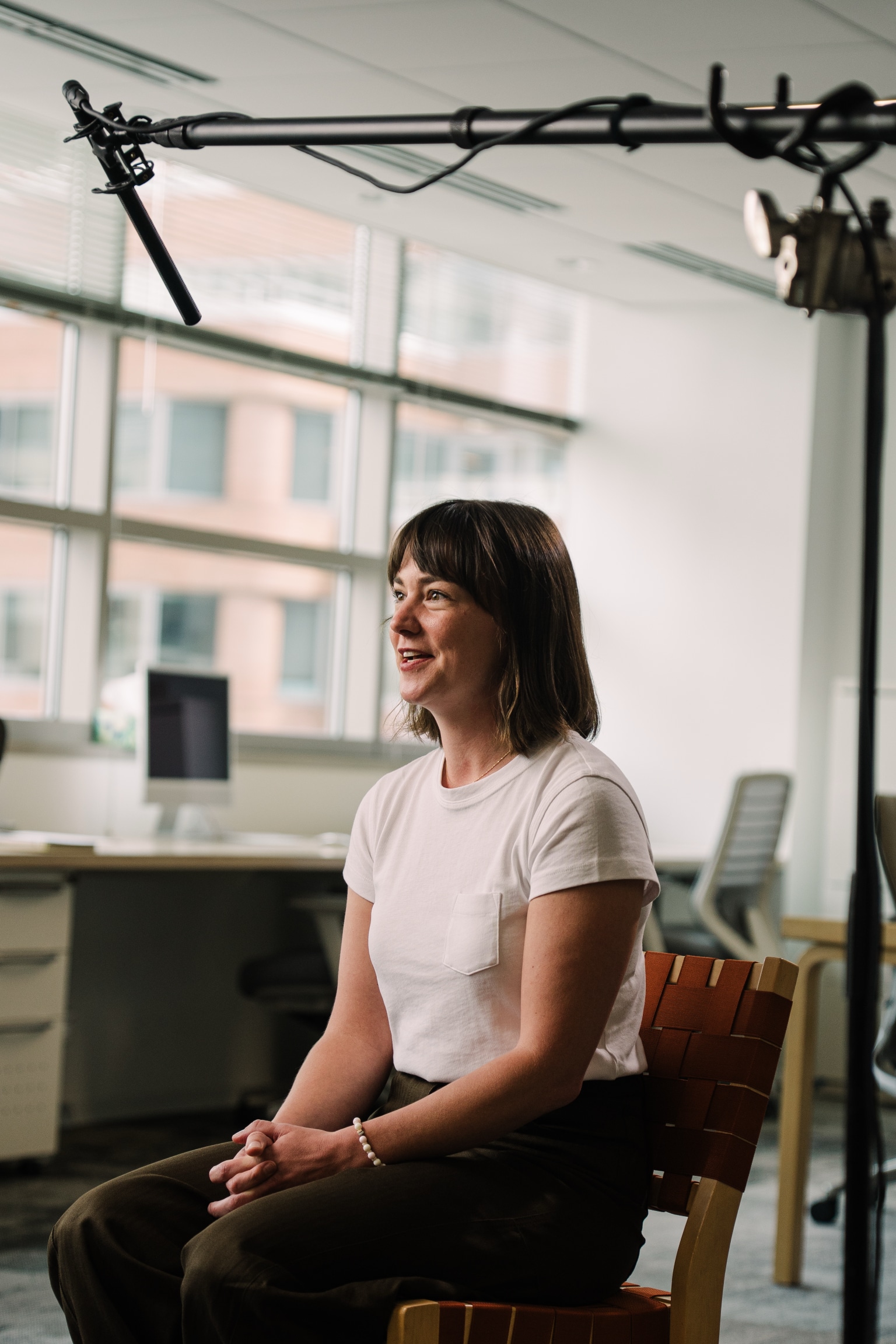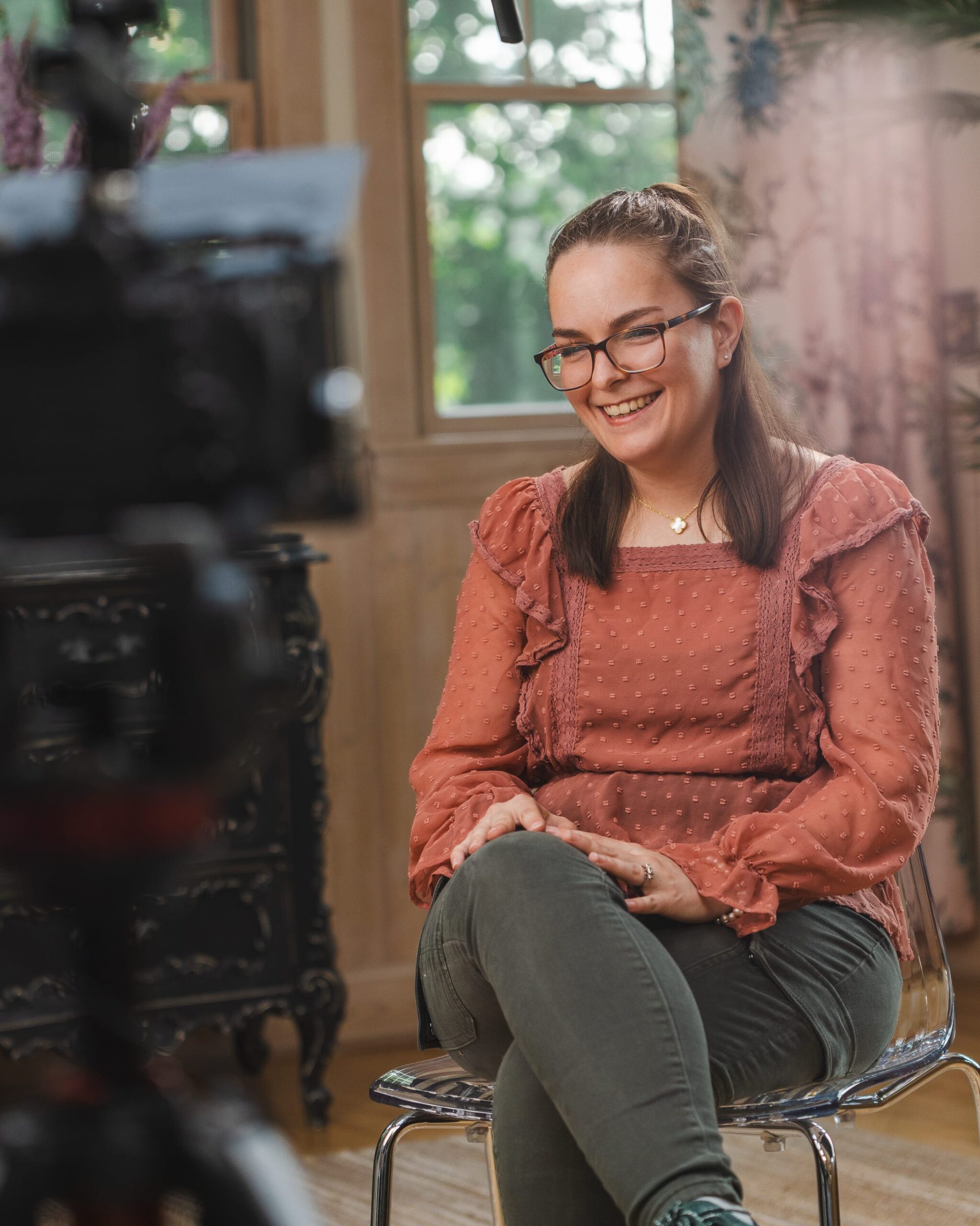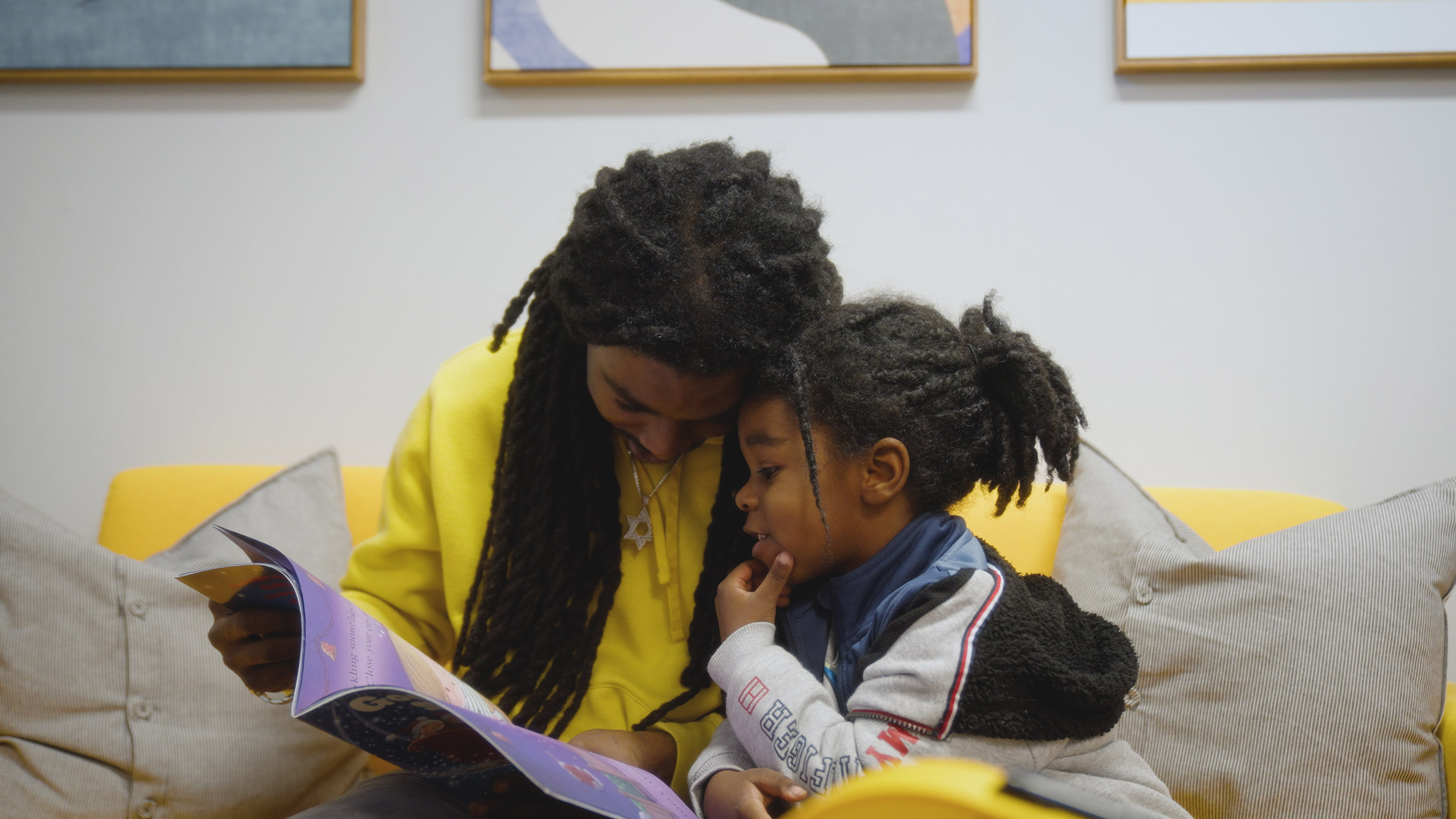Behind the Lens: How We Conduct On-Camera Interviews and Why It Matters
A well-told story resonates and compels. It stays with you long after the credits roll or the browser tab closes. At Storyteller Studios, the heart of these stories lies in the on-camera interview. But if handled poorly, interviews can feel stilted, rehearsed, or worse, manipulative—everything great storytelling should avoid.
We don’t let that happen.
Our approach is built on trust, authenticity, and creating an environment where people feel truly heard. Every question, every camera angle, and every moment is deliberate. Why? Because our goal is to capture stories that are honest and deeply human.
Over the years, we’ve honed our process, informed by principles of communication theory, a little bit of psychology, a deep respect for our subjects, and a relentless pursuit of authenticity. It’s an approach that doesn’t just document. It affirms. And that’s when real, meaningful connections begin.
The Philosophy Behind Our Approach
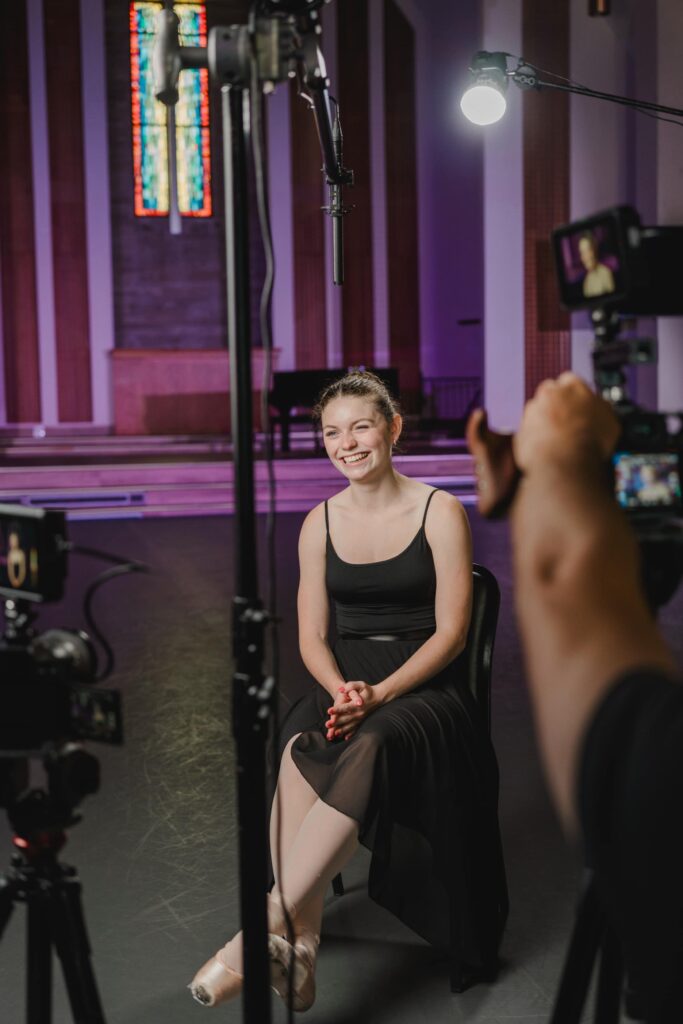
At the core of our interview process is a fundamental belief: stories are about people, not productions. That’s why we prioritize connection over control. We see interviews as moments to affirm the subject’s experience. This isn’t about making interview subjects say words we have planned for them to say, it’s about creating a space where people feel safe to share openly.
Being on camera can be intimidating, even for seasoned professionals. That’s why we approach every interview with humility and respect, ensuring that our subjects feel seen, heard, and valued. We ask thoughtful questions, but we also listen, really listen, because genuine stories emerge when people feel comfortable enough to open up.
Every interview is in service to the story we’re telling. It’s not about making someone recite a script. It’s about creating a space where they can share their perspective in a way that feels natural and genuine.
How We Prepare
We take time to understand the context, mission, and goals for the message. We craft thoughtful questions designed to illicit the responses we want from the interview subject in their own words. And we work to build trust before filming begins. From lighting, to seating, every detail is designed to make subjects look and sound their best and feel at ease, so they know they’re not just a part of a video production, but a collaborator in sharing a meaningful message.
The Interview Process
We begin with small talk, an often-overlooked step that helps our subjects feel at ease. A few moments spent chatting about their day or shared interests can make all the difference in helping everyone feel safe.
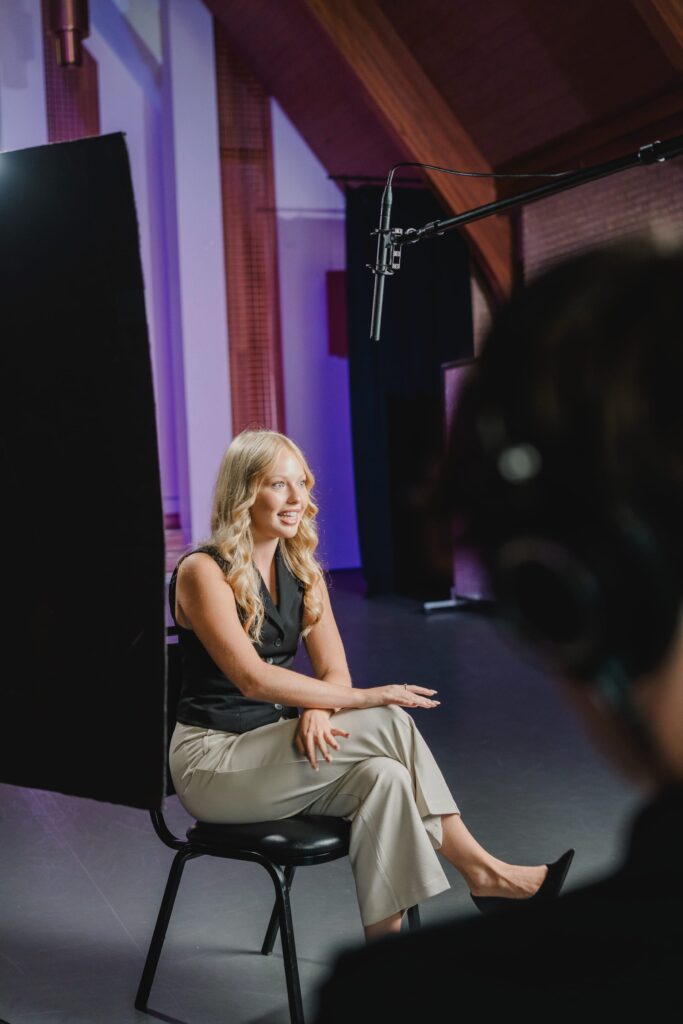
Our interview questions are open-ended and intentionally crafted to invite reflection. Rather than asking for facts, we ask for feelings, experiences, and perspectives. This approach encourages subjects to share more meaningful, personal insights that resonate with audiences.
Throughout the interview, we maintain a conversational tone. We let pauses linger to give our subjects time to think, and we’re never afraid to deviate from our prepared questions if the conversation takes an interesting turn. Flexibility allows for authentic moments to emerge, the kind that can’t be scripted.
We also pay close attention to nonverbal cues. Body language, facial expressions, and tone of voice often reveal more than words alone. By staying attuned to these subtle signals, and using them strategically ourselves, we can guide the interview in a way that feels natural and supportive.
Finally, we ensure that our subjects remain in control. We remind them that they can stop or restart at any time and that they have the final say over how their story is presented. This empowerment builds trust and results in interviews that feel genuine and impactful.
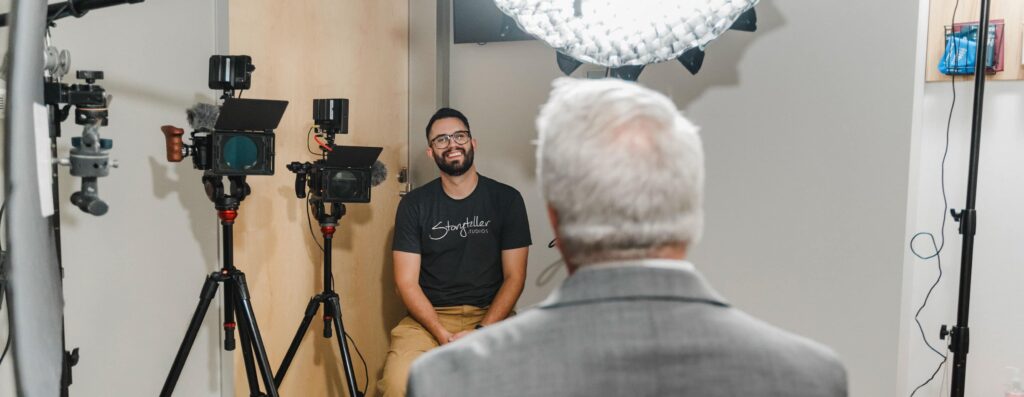
What We Don’t Do And Why
There are several common practices in conducting on-camera interviews that we intentionally avoid. Here’s why:
- We don’t provide written questions to interview subjects ahead of time. Human nature being what it is, many people will prepare their answers in advance, or worse, write them down. This undermines authenticity and makes responses feel rehearsed, losing the natural flow that makes stories compelling. It puts more pressure on the interview subject to keep track of what is in their notes. It also takes the power of film editing out of our hands, which is essential to shaping a cohesive narrative. Worse yet, it turns the interview into a performance rather than a conversation. Even professional actors, let alone documentary interview subjects, can struggle to perform what they’ve written or memorized.
- We don’t ask “yes” or “no” questions. Closed-ended questions limit the depth of responses and miss opportunities to explore the nuances of a subject’s experiences or emotions. Instead, we use open-ended prompts that invite storytelling and reflection.
- We avoid asking leading questions. Leading questions subtly suggest the answer we want, which can make subjects feel manipulated or pressured. For example, instead of asking, “Would you say this project has been a huge success?” we’d ask, “How would you describe the outcome of this project?” This approach ensures that responses are genuine and not influenced by our phrasing.
- We don’t ask interview subjects to “repeat the question in their answer.” This instruction adds unnecessary pressure and often leads to awkward, overly structured responses. Experienced interviewers know how to craft questions and edit footage without this requirement. Our priority is to help subjects feel at ease, not overthink their answers.
- We don’t ask subjects to say and spell their first and last names before we begin. Starting an interview this way can feel awkward and unnecessarily formal, especially when subjects are already navigating the inherent stress of being on camera.
- We don’t simply allow any one interviewee’s responses to dictate the message or the story. Remember, we already know what the story is because we’ve prepared. The interview is our way of giving subjects the honor of telling the story in their own words and, ultimately, in a way that is trustworthy and emotionally compelling to viewers.
- We don’t use the entire interview. Not everything said on camera will make the final cut, and that’s a good thing. Clients sometimes worry about getting every word just right, but we remind them: it’s all going to be edited. The power of editing allows us to craft responses and shape messages that truly resonate. Yes, editing is powerful enough to make someone say something they didn’t, or leave out something they did. At Storyteller Studios, we only use that power to serve the story, never to betray trust.
- We don’t do blooper reels. While they may seem harmless, blooper reels erode trust. Subjects need to feel safe and confident during their interviews, knowing that their vulnerable or unpolished moments won’t be turned into entertainment for others at their expense. Protecting their dignity is a key part of fostering a positive, respectful interview experience. Trust us. We’re Midwesterners. People might laugh it off, but blooper reels hurt more than they help.
Conclusion
The key to an effective video message isn’t the fancy camera or the perfect lighting. It’s the authenticity and trustworthiness of the message itself. At Storyteller Studios, our approach to interviews ensures that every subject’s story is told with respect, care, and emotional resonance. By fostering trust and authenticity, we create videos that connect with viewers and inspire action.
READ LATEST
the
we're storyteller studios
documentary-style film for brands & causes
In 2013, we started leveraging the power of documentary-style film for brands and causes in our hometown of Springfield, Illinois (hence our affinity for Lincoln).
Since then, we’ve worked with clients nationally and traveled to cities including Chicago, St. Louis, Kansas City, Indianapolis, Louisville, and Des Moines.
No matter where you are, we’d be honored to serve your brand next.
featured post
3 Must-Have Ingredients for Marketing Videos That Work
Every effective marketing video relies on three essential ingredients that make it resonate with audiences and drive results—discover what they are and how they can make your next video project a success.
